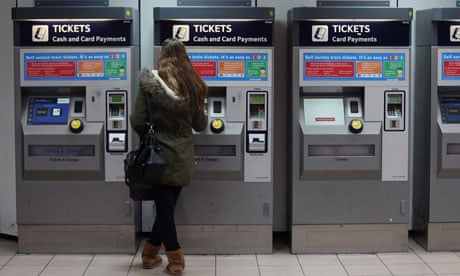The pressure on cash-strapped commuters will worsen next year after the government confirmed that it will reinstate a planned fare rise of 3% above inflation from January.
Ministers had limited the rise to 1% rate this year to ease the financial strain on commuters but the Department of Transport has now confirmed the return to 3% above inflation, which is currently running at 3%. It means rail fares will increase by 6% on average and up to 11% in the most extreme cases.
The decision to defer the planned higher rates was introduced by the transport secretary Justine Greening in a move calculated to lessen the political impact of fare hikes — the most controversial cost-cutting move by the Department for Transport (DfT) since the coalition began.
Labour claimed the move showed that the coalition is "out of touch" with families struggling with the rising cost of living. The Department for Transport said the long-term ambition was to reduce fares.
Train operators have signalled their concern over next year's proposed increase in an internal document that discusses the merits of calling for the retention of the 1% increase, including a plan to use a media advertising campaign to back up their case.
The memo, drawn up by the Association of Train Operating Companies (Atoc), the industry's trade body, outlines the benefits of calling for a smaller increase. It would "position ourselves on the side of the passengers" and "highlight the role the government plays in setting fares"," it says.
Acknowledging the damage that annual fare announcements cause to the industry's image, it adds that calling for a 1% plus inflation increase would also "undermine the perception that train companies want ever higher fare rises to boost profits".
The memo also debates the merits of taking out full page adverts in the Metro newspaper in key commuter cities and asking train operator bosses to front local media campaigns. However, the document admits that going public could "irritate ministers" by appearing to side with campaigners against the government.
Shadow Transport Secretary Maria Eagle said: "If Ministers go ahead with their plan to allow train companies again to hike rail fares by as much as 11 per cent in January it will show how out of touch they are with the cost of living crisis facing families. Many season tickets are now costing more than rent or mortgage payments and simply getting to work is becoming the largest single household bill. When even the NAO has questioned whether hiking fares benefits the taxpayer or just the private train companies, Ministers should listen to Labour's call for a one per cent above inflation cap on fare rises strictly applied across all routes."
A DfT spokesman indicated that a campaign for a 1% increase will be fruitless and the inflation plus 3% regime will return in 2013. He said: "The current agreed regulated fares policy is as set out in the 2011 comprehensive spending review – a rise in 2012 of RPI+1% and RPI+3% for 2013 and 2014, returning to RPI+1% thereafter." The fare cap applies to regulated fares such as season tickets and off-peak fares on long distance routes.Despite Greening's declaration that there is a plan "to end the era of inflation-busting fares", the DfT's admission means the era will continue for some time yet. The government has called for the rail industry to make £3.5bn of annual efficiency savings. But it is also seeking to substantially cut the £4bn a year taxpayer subsidy to the industry, and wants ticket revenue to be a larger source of rail income. Passengers paid £6.6bn in 2010-2011.
Nonetheless, there is a precedent for the government changing its mind on fares. The chancellor, George Osborne, announced a late change of heart – following lobbying by Greening – in his autumn statement last year, setting the cap at 1% over inflation instead of the threatened 3%.
RPI has since fallen from around 5% to 3.1%. However, with train operators allowed to raise fares on selected routes by an additional 5%, if current inflation rates persist some commuters could see the price of their tickets rise by 11% in January. The RPI number used to set the increase is the figure for July, which is published in August.
The DfT spokesman said: "Over the long term we are committed to reducing the cost of the railways and ending the era of above-inflation fare increases."

Comments (…)
Sign in or create your Guardian account to join the discussion